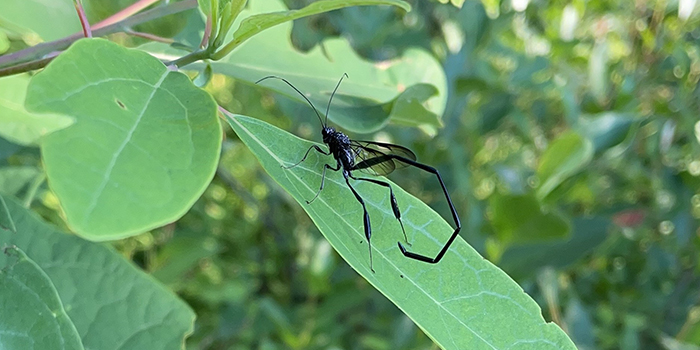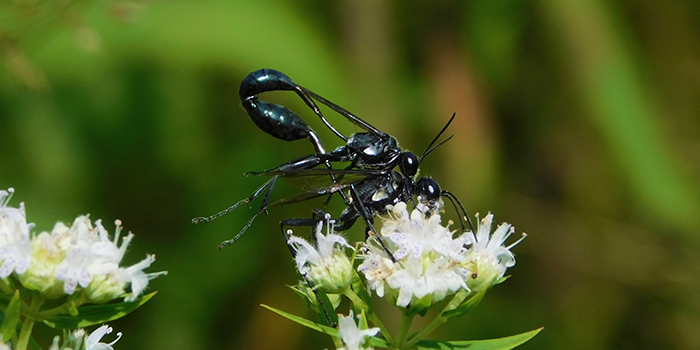Remarkable Pollinators: Part 2
Remarkable Pollinators Part 2: Wasps
By: Ashley Fink, Liz Stahl and Karen Menard
All wasps are not just ill-mannered insects out to ruin your picnic. These insects are important pollinators just like butterflies and bees! They also play other vital ecological roles as predators and parasitoids.
As pollinators, they help to move pollen around with fine hairs attached to their bodies, and as predators, they are critical for controlling insect pest numbers in order to keep populations in check. Wasps that are considered “parasitoid” lay their eggs on or in bodies of arthropods, eventually causing death to the host. Parasitoid species are considered beneficial because they can naturally control insect pests.
Two interesting species of wasp that can be found pollinating our gardens and parks during the late summer are the American Pelecinid wasp (Pelecinus polyturator) (see first photo) and the Gold-marked thread-waisted wasp (Eremnophila aureonotata) (second photo).


Seeking flowers and a drink of nectar, the Pelecid wasp appears lanky and slow flying, sporting a lengthy abdomen five times the size of its body! This unique wasp is a parasitoid species that actually deposits eggs on the eggs of a June beetle. Having no interest in humans, they are not looking to sting despite their somewhat intimidating appearance.
The Gold-marked thread-waisted wasp can often be found pollinating asters, mints, and goldenrods. The female lays its eggs on moth caterpillars, securing a food source for her larvae. After mating, it will bring the paralyzed caterpillar with eggs back to a burrow where it is buried, and the wasp that hatches out will consume the immobile caterpillar for food. This bug is always busy with all of these tasks, and, so, when viewed, appears not to take any interest in humans and is considered not aggressive.
With about 30,000 identified wasp species in the world, there is certain diversity among this group of insects and a lot to interesting behaviors to see. Consider taking a few moments in your garden or along a park trail to quietly watch these beneficial insects alongside bees perform an important “eco-service” for our environment- pollination.
Did You Know? Ash (Fraxinus) trees that are still alive in Oak Openings Preserve Metropark get help from small parasitoid wasps that prey on Emerald Ash borer beetles responsible for killing our ash trees. These insects are obtained and released as part of a Biocontrol program through USDA-Aphis.